In Anne Rice's debut novel, "Interview with the Vampire," she writes into existence a type of vampire unlike any we'd encountered before, one who needs to drink blood to keep their immortal body thriving, but hates the idea of doing so. For Louis de Pointe du Lac, the first reluctant vampire, the act of drinking isn't a dark gift, it's an un-kickable addiction.
Prior to this novel, which was released in 1976, what we knew of vampires came from Bram Stoker's "Dracula" (1897), and later adaptations of that source material brought about by F. W. Murnau's German silent film, "Nosferatu," (1922) and Tod Browning's "Dracula," (1931), starring Bela Lugosi. These vampires, although lovesick, charming and seductive in their own right, lacked the humanity of Rice's — and their depictions would be much harder to tie thematically to addiction because in order for a character to be painted as an addict they have to try to quit whatever it is they're addicted to and find that they cannot. The thought of going "vegetarian," as Louis calls it, substituting animal blood for human blood, would have never crossed Dracula's mind.
Whereas Dracula prowled his eternal nights in search of blood with little reluctance, and only a glimmer of mourning for the living being he once was; Louis is as addicted to his attempt to pass as his once living self as he is to the living blood he subsists on. Speeding through his immortal existence as generations come and go around him, Louis yearns for whatever beautiful and trivial distraction will make his nights feel a little less long, but has only one true need, the need to drink. And while writing this book, that's something that Rice herself could very much relate to.
Anne Rice, whose full maiden name was Howard Allen Frances O'Brien, learned at a very young age what an unquenchable thirst looks like when, at the age of 15, her mother Katherine died from alcoholism. Sadly, Rice grew to develop a thirst of her own and struggled with alcohol from the age of 20 up until a year after the birth of her son Christopher in 1978. In a video titled "Don't Drink," which Rice posted to her YouTube account in 2008 in celebration of 28 years of sobriety, she describes her experience and what eventually made her quit.
Anne Rice learned at a very young age what an unquenchable thirst looks like when, at the age of 15, her mother Katherine died from alcoholism
"From the very beginning, alcohol was very bad for me," Rice says in her video. "For years I was an episodic drunk, then, after a considerable length of time, I became what I would call a steady drunk. I still managed to be very successful at life. I wrote 'Interview with the Vampire' and got drunk at night . . . I wrote 'Feast of All Saints' and managed to get drunk in the evenings afterwards. I don't know that I'd be alive today if I'd kept up the way I was going back in 1978. But something saved me. It was a miracle. And the name of that miracle was Christopher Rice."
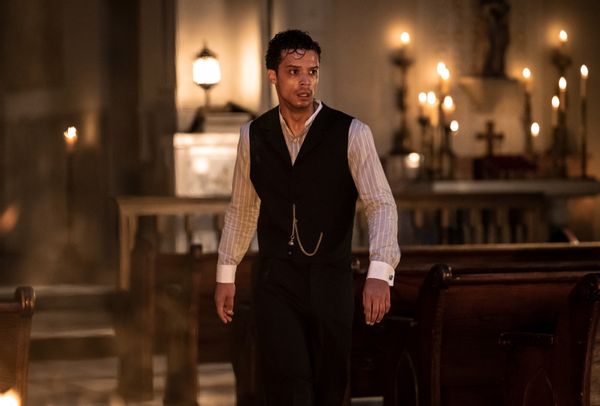 Jacob Anderson as Louis de Pointe du Lac - Interview with the Vampire _ Season 1, Episode 1 (Alfonso Bresciani/AMC)In "Interview with the Vampire," the first of the 13 books in her Vampire Chronicles series, Louis spends a good portion of his early vampire years struggling with his relationship to drinking and how to go about filling his body with the blood it needs without having to kill people in the process. Louis' maker, the co-dependent Lestat de Lioncourt, shames him for this, encouraging him to give in to what he is, which is a killer, but Louis refuses. Along the way there are slips, which every addict must reasonably anticipate and weather the after-effects of, but he makes do with animal blood and blood donated from lovers and servants whom he drinks from without draining to the point of death. Knowing what we know of Anne's own struggles, it's easy to see how she may have written herself into this character.
Jacob Anderson as Louis de Pointe du Lac - Interview with the Vampire _ Season 1, Episode 1 (Alfonso Bresciani/AMC)In "Interview with the Vampire," the first of the 13 books in her Vampire Chronicles series, Louis spends a good portion of his early vampire years struggling with his relationship to drinking and how to go about filling his body with the blood it needs without having to kill people in the process. Louis' maker, the co-dependent Lestat de Lioncourt, shames him for this, encouraging him to give in to what he is, which is a killer, but Louis refuses. Along the way there are slips, which every addict must reasonably anticipate and weather the after-effects of, but he makes do with animal blood and blood donated from lovers and servants whom he drinks from without draining to the point of death. Knowing what we know of Anne's own struggles, it's easy to see how she may have written herself into this character.
"I wasn't even thinking about Lestat when I wrote 'Interview with the Vampire,' I was thinking about Louis," Rice writes in a post shared by a fan page. "Louis was the hero, everything revolved around Louis."
Based on Rice's own husband, poet Stan Rice, Lestat was the character born from Rice's own sorrowful imagination, coaxing her to not only drink, but drink until she was to the point of bursting.
While both Anne and her character Louis grappled with their romantic notions of morality and restraint, Lestat was the polar opposite. Based on Rice's own husband, poet Stan Rice, Lestat was the character born from Rice's own sorrowful imagination, coaxing her to not only drink, but drink until she was to the point of bursting.
Want a daily wrap-up of all the news and commentary Salon has to offer? Subscribe to our morning newsletter, Crash Course.
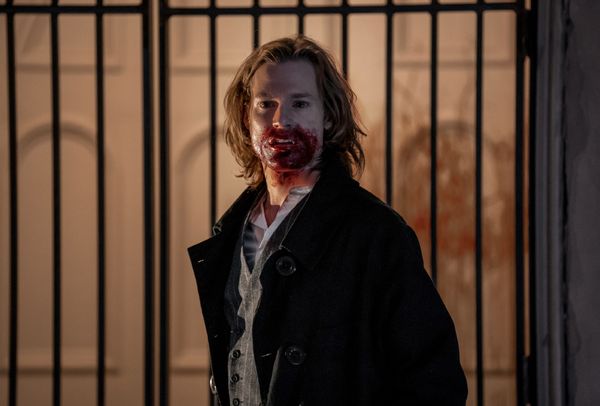 Sam Reid as Lestat De Lioncourt - Interview with the Vampire _ Season 1, Episode 1 (Alfonso Bresciani/AMC)
Sam Reid as Lestat De Lioncourt - Interview with the Vampire _ Season 1, Episode 1 (Alfonso Bresciani/AMC)
"Lestat just sprang to life in the corner of my eye," Rice writes. "This character took on all this ferocity . . . I had an idea of Lestat as the man of action, the man who could do things that I couldn't do, that man who could make the decision that I never had the nerve to make; and the person who could go through life joyfully in spite of the questions that torment me — the doubts that torment me, the horror of death that torments me."
Rice, who passed away in 2021 having lost her husband in 2002, was no stranger to death. In her books, she describes death, and the act of dispatching it, as something poetic, giving it deeper meaning beyond just the end of a life. Like with the themes of drinking and addiction, she used writing as a therapy to cope with some of the darker aspects of her real life.
In 1972, Rice experienced the tragic loss of her 5-year-old daughter Michele from leukemia and, after going on a bender to drown her sorrows, funneled that unspeakable loss into the creation of one of her most famous characters, Claudia, a doll-like child vampire unburdened by the pains of mortality. A daughter who could live forever.
"It was a nightmare," Rice said about her loss in a 2016 interview with Horror Feminista. "I was nothing and nobody. I had no prestige. I wasn't a mother. I was a bad wife — I never cleaned house. I was no good at anything."
Rice used her sadness and addiction to turn "Interview with the Vampire" into so much more than a book about blood-suckers, but a legacy of work that, at the heart of it, is a love-letter to life, and recovery.
After the worst of her grieving, Rice dusted off an old short story she'd written that would eventually become "Interview with the Vampire," and used her sadness and addiction to turn it into so much more than a book about bloodsuckers, but a legacy of work that, at the heart of it, is a love letter to life and recovery.
Rice passed away in California, where she relocated in 2005, after the death of her husband, but she will always be tied to the city of New Orleans, where she lived for most of her life, and which she chose as the setting for her Vampire Chronicles. If you've spent any amount of time in New Orleans at all, then you know how hard it would be to try to kick a drinking habit in a place that literally has drive-through daiquiri shops and bars that advertise "big ass beers." She put her own struggles into these books, and her characters guzzled in ways she could no longer allow herself, or, in the case of Louis, acted as sponsor in her own recovery.
"Suddenly, when I was in the skin of Louis . . . I slipped into this seemingly unreal thing and looked through his eyes, I could make my whole world real," Rice said to Horror Feminista. "He was able to say, 'Let me tell you about New Orleans; this was our world,' and I could write about all the beauty. Even the most fictional stuff in there was somehow out of my real world. It fell into place and was coherent . . . I didn't know it at the time, but it was all about my daughter, the loss of her and the need to go on living when faith is shattered. The lights do come back on, no matter how dark it seems."
Rice died during the early stages of filming AMC's TV adaptation of "Interview with the Vampire," a project that she toiled for many years to get into the right hands. In interviews, show creator Rolin Jones, Jacob Anderson, who plays Louis and Sam Reid, who plays Lestat, have all expressed that as huge fans of Rice, they'd wished she'd been able to see what they've done with her characters. As someone who read first editions of her Vampire Chronicles as they came out, and who also struggles with alcohol, I would bet a thousand nights that she would have appreciated the many ways in which the show pushes the themes of her book to the forefront.
In AMC's "Interview with the Vampire," Louis becomes a vampire shortly after the death of his brother. In the show's first episode, "In Throes of Increasing Wonder. . . " he describes what it felt like to be drunk on Lestat's blood for the first time.
Reconnecting with journalist Daniel Molloy (Eric Bogosian) to continue a discussion that began in Rice's debut novel, Louis asks him to think back to his own days as an addict and recall the best he'd ever had.
"Imagine that flowing inside your veins again, now multiply it by miles to the rings of Saturn and back," Louis says.
Louis walks the streets with Lestat as he points out passing humans and compares them to different types of alcohol.
In Episode 2, ". . . After the Phantoms of Your Former Self," he goes into further detail, describing his first moments as a newly made vampire, walking the streets with Lestat as he points out passing humans and compares them to different types of alcohol.
"Lestat's blood was giggling inside me; teasing my senses, illuminating the District with overwhelming detail, as if I'd walked my entire life as a dead man," Louis says.
"You were f**king loaded," Daniel replies.
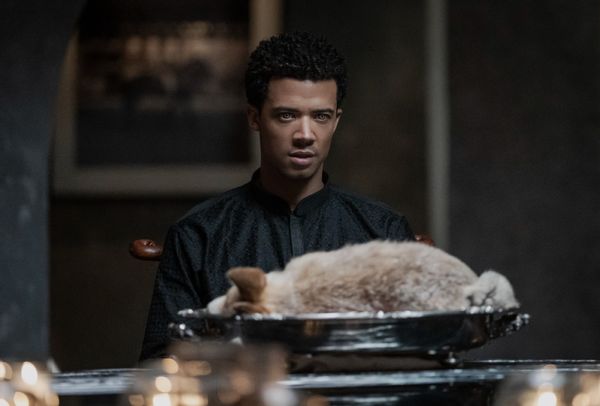 Jacob Anderson as Louis de Pointe du Lac - Interview with the Vampire _ Season 1, Episode 2 (Alfonso Bresciani/AMC)
Jacob Anderson as Louis de Pointe du Lac - Interview with the Vampire _ Season 1, Episode 2 (Alfonso Bresciani/AMC)
As an introvert who first read Rice's "Interview with the Vampire" in high school, I would think of her written descriptions of these experiences as I chugged whole bottles of Boone's Farm at parties, waiting for that moment where my true self cracked out of its shell, allowing me to navigate the room in ways I felt I couldn't have otherwise. As a sober person I was stoic, trapped inside myself. But once drunk, I could step outside of the prison my own mind kept me in and be free. This has always been the allure of drinking for me. It has the ability to calm me, comfort me, help me really "live." But as any addict or vampire knows, such apparent gifts come with consequences. For both alcoholics and vampires, those consequences are often death.
Rice saw her mother die at the bottom of a bottle. "As a matter of fact, I think she swallowed her tongue," she said in an interview
Rice saw her mother die at the bottom of a bottle. "As a matter of fact, I think she swallowed her tongue," the writer told Horror Feminista, describing the severity of the addiction that stole her own maker away from her. For Louis, the consequence of his addiction was his own witnessing of the loss of life, by his own hand, which caused him to break away from the norms of his own vampire companions in a way that others were not strong enough to do, or had no interest in considering.
In Episode 4 of AMC's "Interview with the Vampire," ". . . The Ruthless Pursuit of Blood with All a Child's Demanding," we see what the full-fledged party years of addiction look like for a vampire when Claudia (Bailey Bass) drinks her way through the population of New Orleans.
Saved from a burning building as a young girl by Louis, and turned into a vampire by Lestat, Claudia's eternal youthful enthusiasm turns her need for blood into an unbridled and unquenchable frenzy. If you were a drinker in college, think back to those nights when you could slam upwards of 10 red cups of beer, wake up for brunch the next afternoon, and then do it all over again that night without giving it a second thought. Now "multiply it by miles to the rings of Saturn and back," to steal a phrase from Louis, and that's what life as a fledgling vampire is like for Claudia.
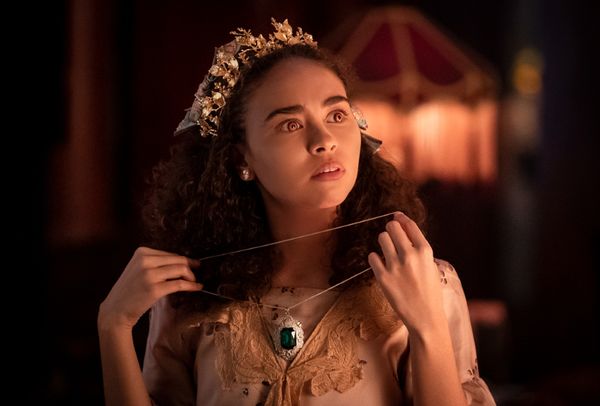 Bailey Bass as Claudia - Interview with the Vampire _ Season 1, Episode 4 (Alfonso Bresciani/AMC)Having been made a vampire at such a young age, Claudia will never be able to grow out of her youthful hunger. While she eventually does mourn the fact that she'll never blossom into a woman, never have children, and never marry a man who isn't the sort who would be OK with sleeping with the body of a child, she's absolutely fine with her drinking habits, which she doesn't see as a problem at all.
Bailey Bass as Claudia - Interview with the Vampire _ Season 1, Episode 4 (Alfonso Bresciani/AMC)Having been made a vampire at such a young age, Claudia will never be able to grow out of her youthful hunger. While she eventually does mourn the fact that she'll never blossom into a woman, never have children, and never marry a man who isn't the sort who would be OK with sleeping with the body of a child, she's absolutely fine with her drinking habits, which she doesn't see as a problem at all.
"I tasted it, and right away I felt as strong as a streetcar," Claudia says, describing the first moment she tasted Lestat's blood. "I realized what I thought was heaven was just some nice room. And what I thought were angels were really Hell demons . . . I decided to make the best of it."
Addiction, much like a vampiric craving for blood, waxes and wanes in terms of its influence. There are days and nights when it may seem easy to pull back, or abstain all together, and there are others when it feels like there's not enough in the world to satiate your thirst. For Rice, and for her vampires, the main differential is in how that unending thirst is dealt with. For Rice and Louis, they hold themselves to a certain standard. For Lestat and Claudia, they give into it completely, drinking like fat ticks.
At the end of Rice's "Interview with the Vampire," Claudia is killed and, in this moment, she essentially loses her daughter Michele for a second time.
In describing to Horror Feminista how she grappled with that ending, Rice said "that Claudia had really been meant to die at the end of 'Interview' the way Michelle had died . . . I almost died myself and went kind of crazy. I saw germs on everything and washed my hands 50 times and really cracked up."
Sacrificing Claudia, mourning the death of her daughter, and wrestling with her own thirst for booze sent Rice spinning all over again, only to emerge from the depths of her despair years later, born anew with the birth of her son. A mother and child, gazing upon the world with new eyes.
"Don't make the mistakes I made," Rice says in her 'Don't Drink' video. "Don't give your young years to drinking. Don't give your young adulthood to being drunk."
Lestat would likely roll his eyes at that. But Louis, Rice's hero, who was created by her and will live on in her memory, would happily toast a warmed glass of donated AB negative in her honor.


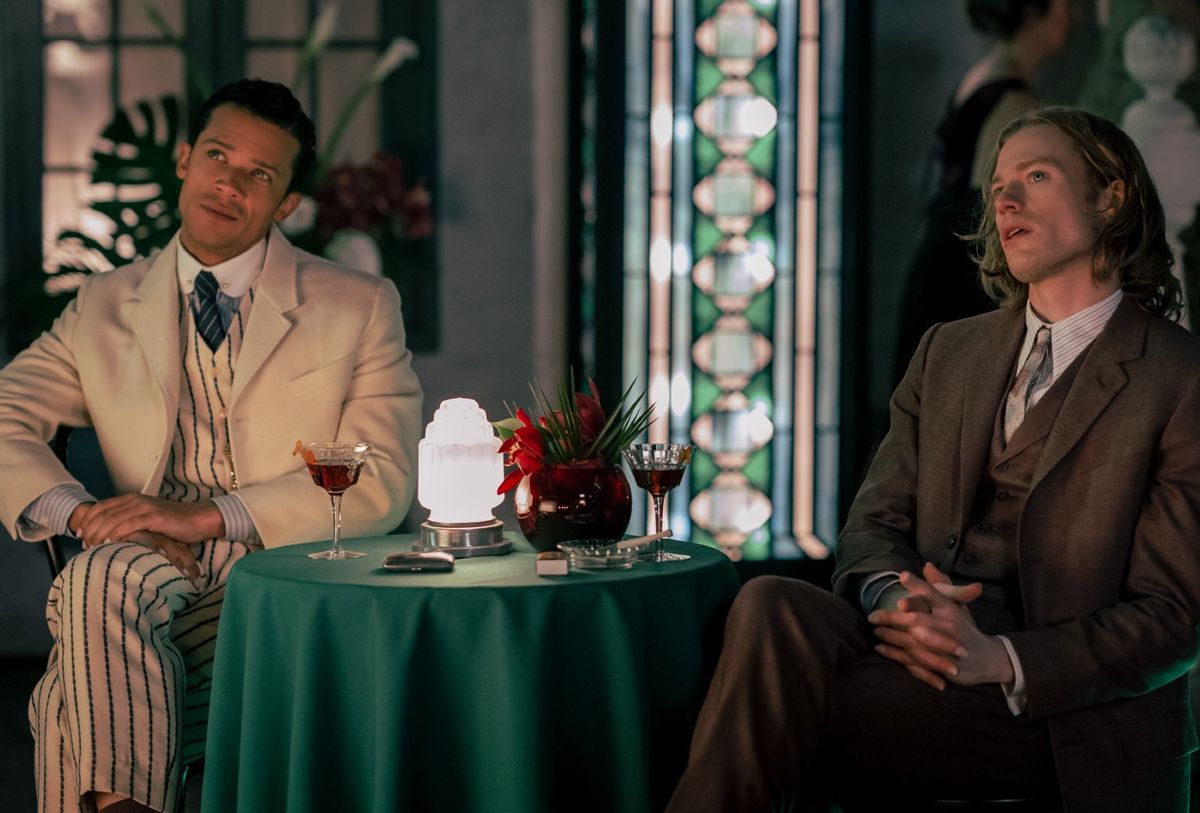
Shares